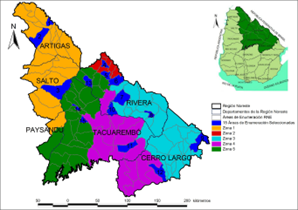Family Production in the Northeastern Region of Uruguay
a view from the rural territory
DOI:
https://doi.org/10.31285/AGRO.26.963Keywords:
territory, agribusiness, family productionAbstract
In the Northeast Region of Uruguay, the territorial expansion of agribusiness through soybean monoculture and forestry is intensifying, causing important changes in the productive, social and landscape base. The aim of this paper is to describe quantitatively and qualitatively the changes in land use, the recent transformations in the agrarian territories of the region, and to identify the impacts of these processes on the migration of family farmers and their families from the agrarian to the urban space. For its development, a bibliographic, documentary and statistical data review was carried out, together with the analysis of the territory through the use of satellite images and field work with interviews with more than 500 family farmers. The results show that monocultures linked to agribusiness have modified the agrarian structure and land use, with increasing pressure on the land, what threatens the presence of family producers.
Downloads
References
Achkar M. El bioma pampa: un territorio en disputa. In: Wizniewsky CRF, Foleto EM, editors. Olhares sobre o pampa: um território em disputa. Porto Alegre: Evangraf; 2017. p. 125-39.
Achkar M, Freitas G, Bessonart M, Díaz I. Permanencia de productores familiares en la Región Noreste de Uruguay: una aproximación desde los referentes institucionales. Geogr Ens. Pesqui [Internet]. 2018 [cited 2022 Mar 30];22:e27. doi:10.5902/2236499429586. DOI: https://doi.org/10.5902/2236499429586
Altieri M. La agroecología como alternativa sostenible frente al modelo de agricultura industrial. Realidad Económica. 2007;(229):75-93.
Caporal F. Agroecología: ciencia para agriculturas más sostenibles. América Latina en Movimiento. 2013;(487):6-10.
Carámbula M. De la identidad de la resistencia a la identidad proyecto: la Producción Familiar en Canelones y los Territorios de la Soberanía. Córdoba: Centro de Estudios Avanzados, Universidad Nacional de Córdoba; 2016. 23p.
Carter M. Democracia, sociedad civil y participación popular en América Latina. Miríada. 2010;3(6):7-45.
Childe R, Achkar M, Freitas G, Webler J. Transformações sócio-territoriais na Região Nordeste do Uruguai entre os anos de 2000-2018. Geografares. 2020;(31):241-67.
Domínguez A. La territorialización del capital y la monopolización del territorio pampa. In: Wizniewsky CRF, Foleto EM, editors. Olhares sobre o pampa: um território em disputa. Porto Alegre: Evangraf; 2017. p. 90-100.
Figari M, Rossi V, González R. Los productores familiares. In: Chiappe M, Carámbula M, Fernández E, editors. El campo uruguayo: una mirada desde la Sociología Rural. Montevideo: Facultad de Agronomía; 2008. p. 83-102.
Gazzano I, Achkar M, Apezteguía E, Ariza J, Gómez Perazzoli A, Pivel J. Ambiente y crisis en Uruguay: la agroecología como construcción contrahegemónica. Revista de Ciencias Sociales [Internet]. 2021 [cited 2022 Mar 30];34(48):13-40. doi:10.26489/rvs.v34i48.1. DOI: https://doi.org/10.26489/rvs.v34i48.1
Guzmán G, González De Molina M, Sevilla Guzmán E. Introducción a la agroecología como desarrollo rural sostenible. Madrid: Mundi-Prensa; 2000. 535p.
INE. Censo 1996 [Internet]. Montevideo: INE; 1996 [cited 2022 Mar 30]. Available from: https://bit.ly/3kUfzJy.
INE. Censos 2011[Internet]. Montevideo: INE; 2011 [cited 2022 Mar 30] Available from: https://bit.ly/3kP9BK1.
Ministerio de Ganadería, Agricultura y Pesca, DGDR (UY). Estado de situación de la producción familiar agropecuaria y los agricultores familiares en base al CGA y RPFA [Internet]. 2014 [cited 2022 Mar 30]. 26p. Available from: https://bit.ly/3s6eulQ.
Ministerio de Ganadería, Agricultura y Pesca, DIEA (UY). Anuario estadístico agropecuario [Internet]. Montevideo: MGAP; 2019 [cited 2022 Mar 30]. 255p. Available from: https://bit.ly/32f0wBw.
Piñeiro D. Concentración y extranjerización de la tierra en el Uruguay. In: Manzanal M, editor. Las agriculturas familiares del MERCOSUR: trayectorias, amenazas y desafíos. Buenos Aires: CICCUS; 2010. p. 153-70.
Piñeiro D. En busca de la identidad: la acción colectiva de los conflictos agrarios de America Latina. Buenos Aires: CLACSO; 2004. 344p.
Rodriguez S, Gonzalez M, Cabrera C, Mila F, Sganga F. El Registro de Productores Familiares como base para la ejecución de políticas diferenciadas. In: Anuario Opypa 2016. Montevideo: MGAP; 2016. p. 397-408.
Sabourin E, Samper M, Le Coq JF, Massardier G, Sotomayor O, Marzin J. Análisis transversal de las políticas sobre agricultura familiar en América Latina. In: Sabourin E, Samper M, Sotomayor O, editors. Políticas públicas y agriculturas familiares en América Latina y el Caribe: balance, desafíos y perspectivas. Santiago de Chile: Naciones Unidas; 2014. p. 19-44.
Sevilla Guzman E. Sobre los orígenes de la agroecología en el pensamiento marxista y libertario. La Paz: AGRUCO; 2014. 168p.

Downloads
Published
How to Cite
Issue
Section
| Article metrics | |
|---|---|
| Abstract views | |
| Galley vies | |
| PDF Views | |
| HTML views | |
| Other views | |















